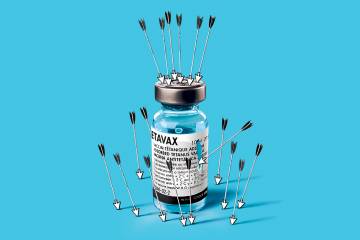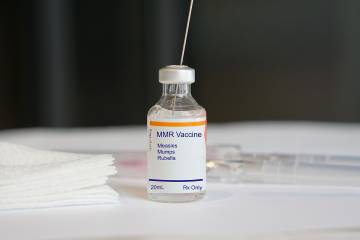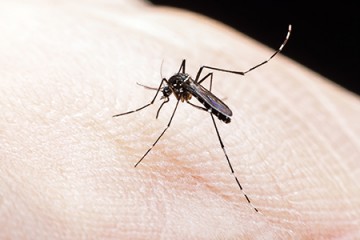Last year, the United States experienced its worst outbreak of measles in over 25 years. The disease's telltale rash swept through Orthodox Jewish communities in New York, where vaccination rates had dropped, and a California outbreak left more than 700 college students and staff under a precautionary quarantine. Globally, measles cases spiked 30% in 2019, bolstering the World Health Organization's decision to place vaccine hesitancy alongside epidemics such as Ebola and HIV on its list of the top 10 global health threats. Public health advocates point to the spread of misinformation about the safety and importance of vaccinations for measles and other preventable illnesses as a major contributor to hesitancy, the reluctance or refusal to vaccinate.

Image credit: Cathal Duane
When tracking down potential sources of misinformation, Mark Dredze zeroed in on one likely culprit: Facebook. The associate professor of computer science is co-author of Social Monitoring and Public Health, a book examining the interplay of social media and public health. "While there's been some research into political advertising on Facebook, we have little information about how such social media advertising shapes other personal decisions, including on issues like vaccines," Dredze says. His recent study of that subject, published in November's issue of Vaccine, made a troublesome finding: A majority of the anti-vaccine Facebook ads examined in the study period from late 2018 through early 2019 came from just two groups.
The social media juggernaut with well over 1 billion global users is already in the crosshairs, accused of allowing for the spread of misinformation in the 2016 presidential election. In 2018 Facebook created a searchable archive of ads deemed of "national importance," bringing some transparency to a murky world of online advertising.
Working with researchers at the University of Maryland and George Washington University, Dredze analyzed 309 archived vaccine-related Facebook ads. While the 163 ads promoting vaccination came from a breadth of advocacy groups, philanthropies, and public health agencies, a majority of the 145 anti-vaccine ads were from the World Mercury Project or Stop Mandatory Vaccination. "It's important to understand who is actually shaping the marketplace," Dredze says. "It's not a broad movement of hundreds of organizations but a concentrated number of people." This is dangerous, he says, because it gives these groups outsize influence and makes it appear that the safety and efficacy of vaccines are still in question.
Ease of access is one likely reason anti-vaccine groups turned to the social media platform. Unlike the high costs of ads on television or in major magazines, Facebook advertising is cheap—the vast majority of ads in the study cost less than $500 to run. "These aren't million dollar campaigns. The barrier to entry is very low," Dredze says. (To quote the study: "Any user with a Facebook account and a credit card can launch an advertising campaign on Facebook in a matter of minutes.") Making this method of communication particularly potent, Facebook ads allow for demographic targeting. If the goal is to influence decision making around childhood vaccinations, women of childbearing age would be a key group to focus on. Facebook lets you do that.
Facebook has since made it a policy not to accept ads containing vaccine misinformation, such as those touting a long-disproved study linking vaccinations and autism. But Dredze doesn't think their oversight goes far enough. Anti-vaccine groups, believing that vaccines weaken immune systems, contain unsafe toxins, or pose other dangers, can massage their ads to be vague enough to pass Facebook's muster and hide behind innocuous-sounding covers, such as the National Vaccine Information Center. "It sounds like a reputable, maybe even federal government, organization," Dredze says. "And such groups can run ads stating that 'vaccination is a complex topic and you may have questions,' and if you click on the link, you are exposed to tremendous amounts of vaccine misinformation."
While expressing empathy for the hard decisions Facebook has to make, Dredze maintains it is more than reasonable for the social media giant to simply stop accepting ads from all anti-vaccine groups. "I'm not saying censor what individual users talk about or share," Dredze says. "That is different from accepting money from organizations whose goal is to lower the vaccination rate," a practice that may lead to disease outbreaks and even deaths. He looks back 50 years to when public health groups successfully lobbied to ban cigarette ads from television and radio. "We know that Philip Morris makes products that kill people," Dredze says. "And so, we're not going to let them or other tobacco companies run ads saying that cigarettes are a personal choice that everyone needs to make for themselves. That would be absurd."
Posted in Science+Technology
Tagged social media, computer science, facebook, anti-vaxxers, misinformation, fake news










